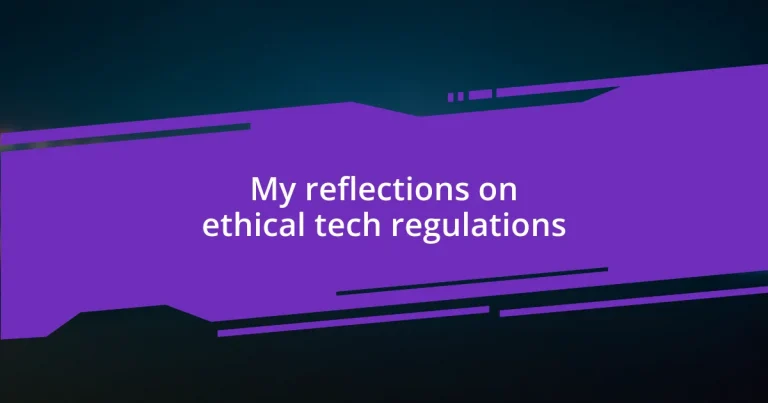Key takeaways:
- The need for ethical tech regulations is critical as technology evolves faster than existing laws, requiring ongoing adaptation and engagement from society.
- Key frameworks like GDPR and IEEE 7000 emphasize the importance of user consent, data protection, and ethically-aligned AI development, reflecting the integral role of ethics in technology.
- Challenges in implementation include bureaucratic inertia, inconsistent regulations across regions, and the need for smaller companies to navigate compliance without stifling innovation.
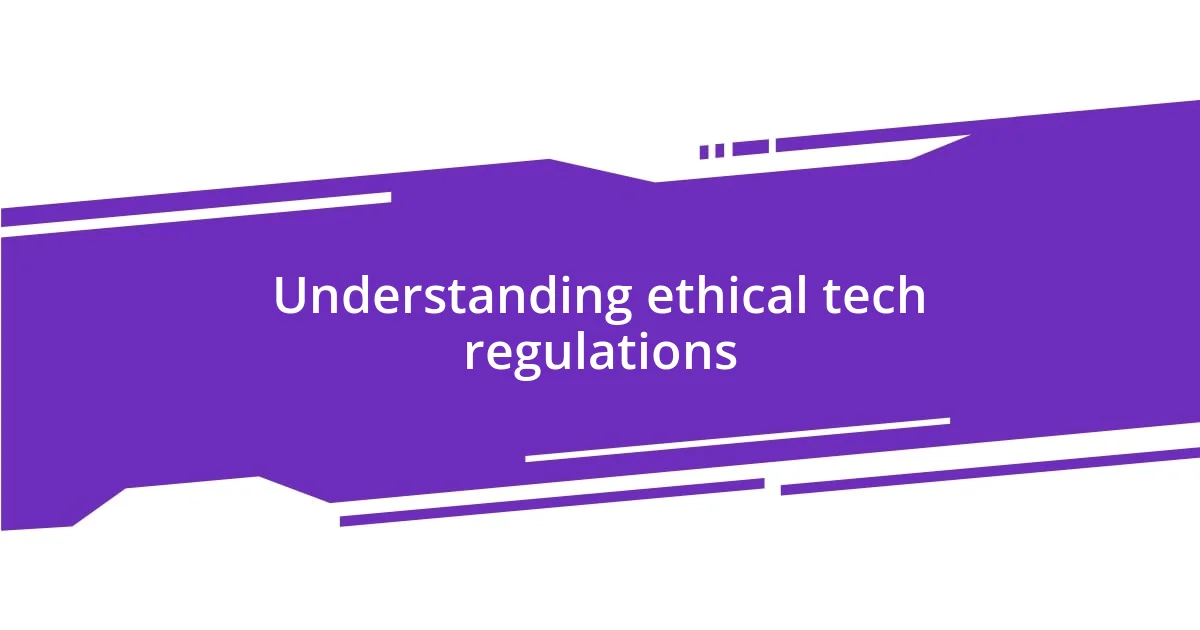
Understanding ethical tech regulations
Understanding ethical tech regulations is crucial in today’s digital landscape. I often find myself pondering how technology is rapidly evolving, often outpacing current laws designed to govern it. Have you ever thought about the implications of artificial intelligence making decisions about our privacy and data? It’s a conversation that makes my mind race with both excitement and concern.
As I delve deeper into the nuances of these regulations, I realize they must balance innovation with protection. For instance, I remember my friend launching a startup focused on data privacy. The amount of contemplation he had to do regarding compliance was immense, yet he expressed how, in his view, ethical guidelines could foster trust among users. Isn’t it fascinating how regulations can stimulate not just safe use but also a stronger connection between tech and its users?
Moreover, ethical tech regulations should evolve alongside technology itself. Reflecting on this, I recall attending a panel discussion where a renowned ethicist emphasized that regulations are not just rules but a framework for how we want our society to function. It struck me—can we really shape a better digital future if we don’t continuously adapt and discuss these guidelines? It’s a vital question that calls for engagement and reflection from all of us.
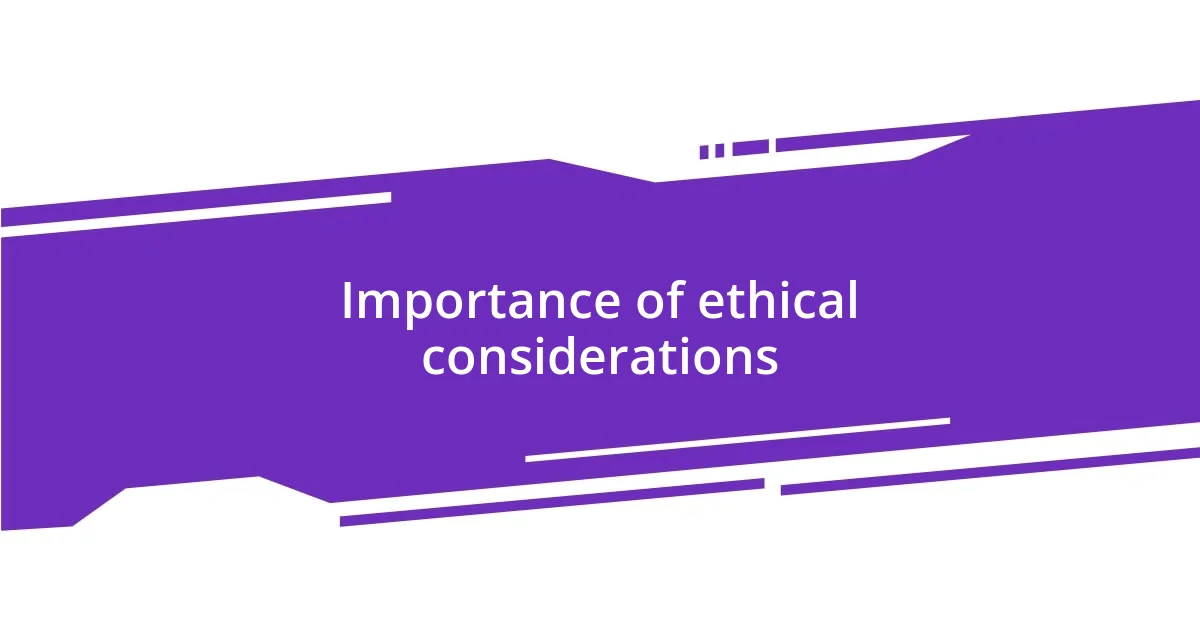
Importance of ethical considerations
Ethical considerations in technology are not just nice-to-have; they are essential. I remember the first time I encountered a chatbot that didn’t quite understand my queries, leading to a frustrating experience. It made me think about the importance of designing tech that empathizes with users. When companies prioritize ethics, it shows a commitment to putting people first, which fosters trust and user loyalty.
Here are several reasons why ethical considerations in tech are so vital:
- Trust Building: Ethical practices cultivate a sense of security for users, which is crucial for long-term engagement.
- User Empowerment: Clear ethical guidelines give users control over their data, enabling them to make informed choices.
- Innovation with Integrity: Companies that uphold ethical standards often lead the way in creating innovative solutions that respect user rights.
- Responsibility and Accountability: Ethical considerations encourage tech companies to be accountable for their impact, creating a culture of responsibility.
- Societal Impact: Thoughtful tech regulations can shape a society that values human rights and dignity, promoting equitable access to technology.
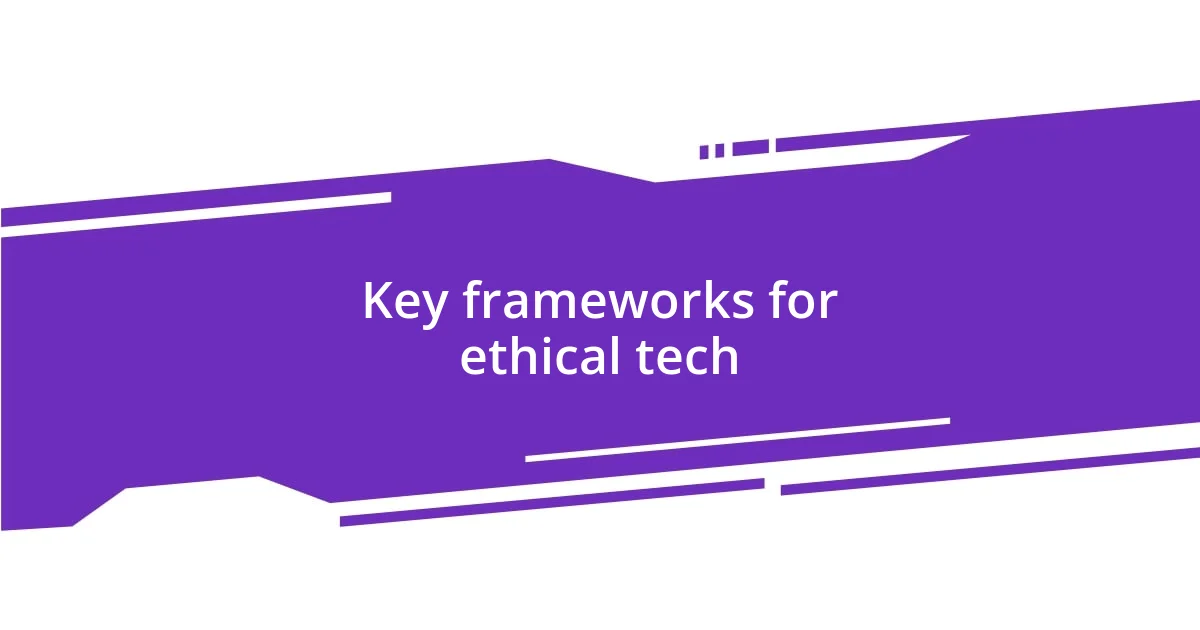
Key frameworks for ethical tech
Building ethical tech frameworks is essential, particularly as the pace of digital innovation accelerates. One of the most talked-about frameworks is the GDPR (General Data Protection Regulation), which emphasizes user consent and data protection. I once worked on a project that had to comply with GDPR, and I was genuinely amazed at how thorough and user-centered the principles were. It made me appreciate the concept of data sovereignty—how users deserved to own and control their data.
Another framework to consider is the IEEE 7000 series, which provides guidelines for designing ethically-aligned artificial intelligence. I recall being part of a seminar where the speaker highlighted the importance of ethical considerations in AI development. It sparked a lively discussion about transparency in algorithms, which reminded me of the responsibility developers have to ensure their creations are not just innovative but also just. Getting more involved in these discussions has prompted me to rethink how I approach technology in my own life.
Then there’s the ethical framework established by organizations like the ACM (Association for Computing Machinery), focusing on the broader social impacts of computing. This has led me to reflect on the implications of technology adoption in various sectors, from healthcare to finance. I can’t help but think about my interactions with health-tech apps. When transparency and user rights are prioritized, it not only enhances my trust but also makes me feel valued as a user. These experiences remind me how integral ethical frameworks are to shaping a future where technology and humanity flourish together.
| Framework | Key Focus |
|---|---|
| GDPR | User consent and data protection |
| IEEE 7000 | Ethically-aligned AI development |
| ACM | Social impact of computing |
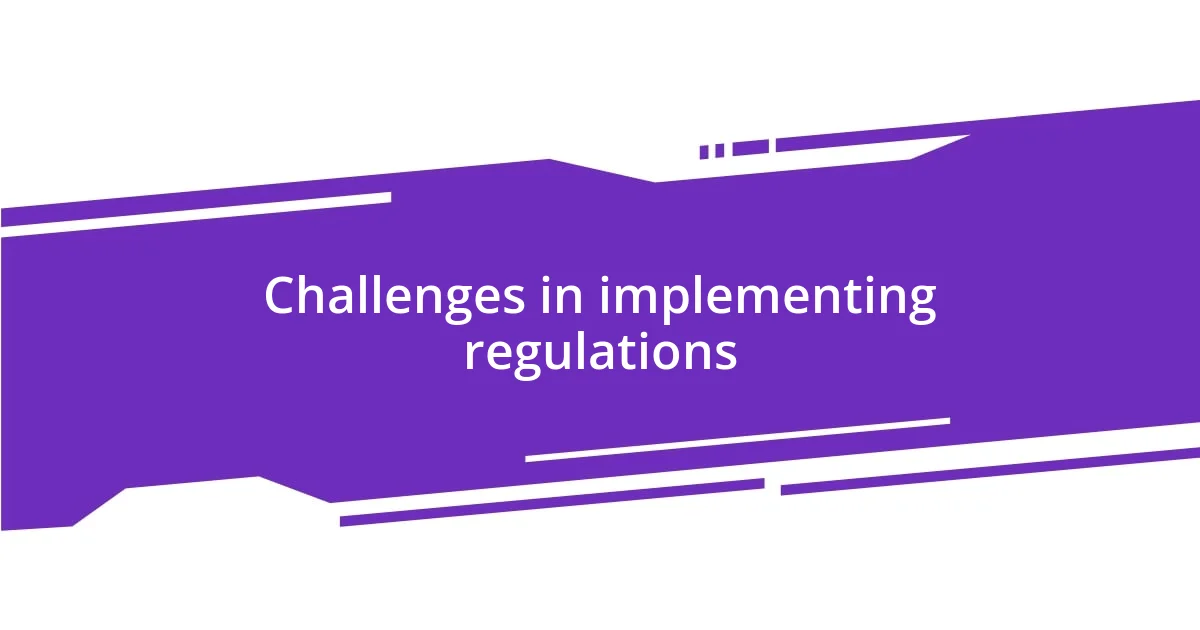
Challenges in implementing regulations
The path to implementing tech regulations is paved with complexities. For instance, I once attended a conference where experts discussed the inertia of bureaucratic processes. It struck me how slow and cumbersome regulation can be, often lagging behind rapid technological advancements. How can we expect effective oversight when laws take years to form, long after a tech trend has already evolved?
Another significant challenge is the inconsistency in regulations across different regions. Having worked with international teams, I’ve seen firsthand how varying compliance standards can create confusion and hurdles. When companies face a patchwork of laws, what happens to the innovation that keeps tech dynamic and responsive? It often leads to a race to the bottom, where businesses prioritize meeting the lowest standard rather than aspiring to higher ethical practices.
Furthermore, resource allocation becomes a crucial factor. I recall a startup I consulted for, which focused on ethical AI but struggled with funding compliance measures. Often, smaller companies are left wrestling with regulatory demands that seem daunting and overwhelming. Shouldn’t we consider how these regulations can be designed to support rather than stifle innovation? The current system feels misaligned when the very regulations meant to protect users can inadvertently hinder progress.
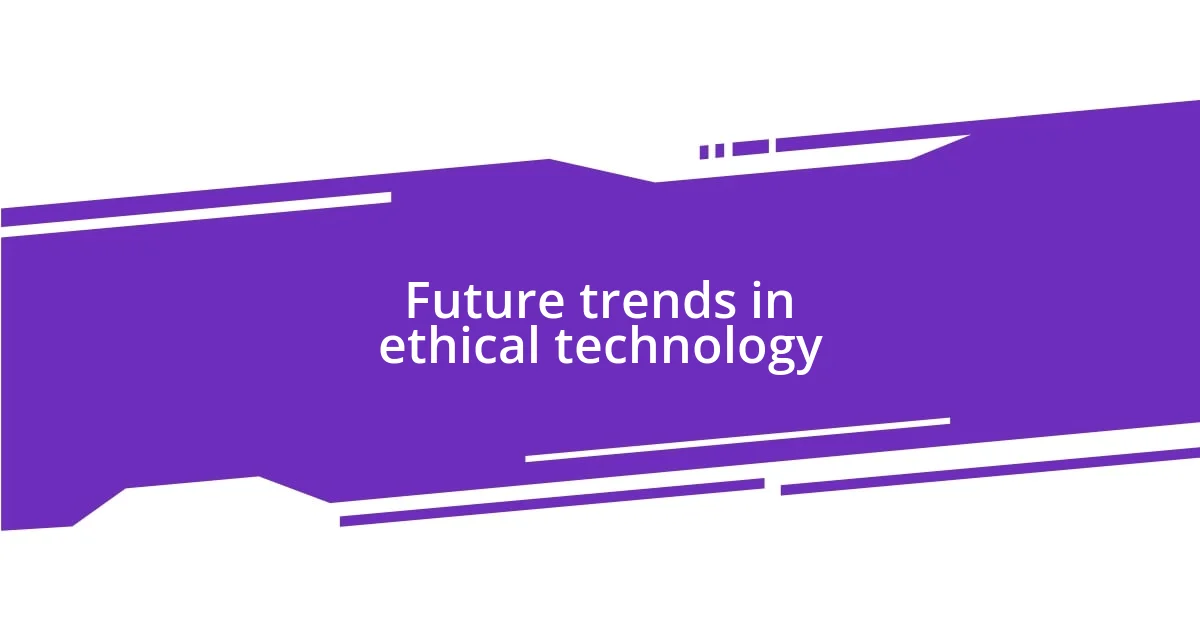
Future trends in ethical technology
As I look towards the future of ethical technology, one trend that stands out is the increasing integration of ethical considerations right from the design stage. I remember a project where designers used ethical impact assessments before launching, which was refreshing. It made me question: what if every tech development prioritized ethics as a core principle instead of an afterthought? This shift could lead to innovations that are not just functional but also responsible.
Another intriguing trend is the rise of decentralized technologies, like blockchain, which promise enhanced transparency and ownership. I’ve been fascinated by how this technology allows users to have more control over their data, making it a powerful tool for ethical governance. It brings to mind the idea of digital empowerment—can we truly harness technology if we don’t own our data? By embracing such solutions, we might actually cultivate a deeper trust between tech and users.
Then there’s the broader societal dialogue we’re seeing about ethical tech. During a recent panel discussion, experts emphasized that our collective voice is crucial for shaping future regulations. It made me realize the importance of public input in tech policies. Shouldn’t we all engage in these conversations to ensure our values are reflected in the technology we use daily? By fostering a more inclusive dialogue, we could potentially build a tech landscape that genuinely prioritizes the user experience while upholding ethical standards.
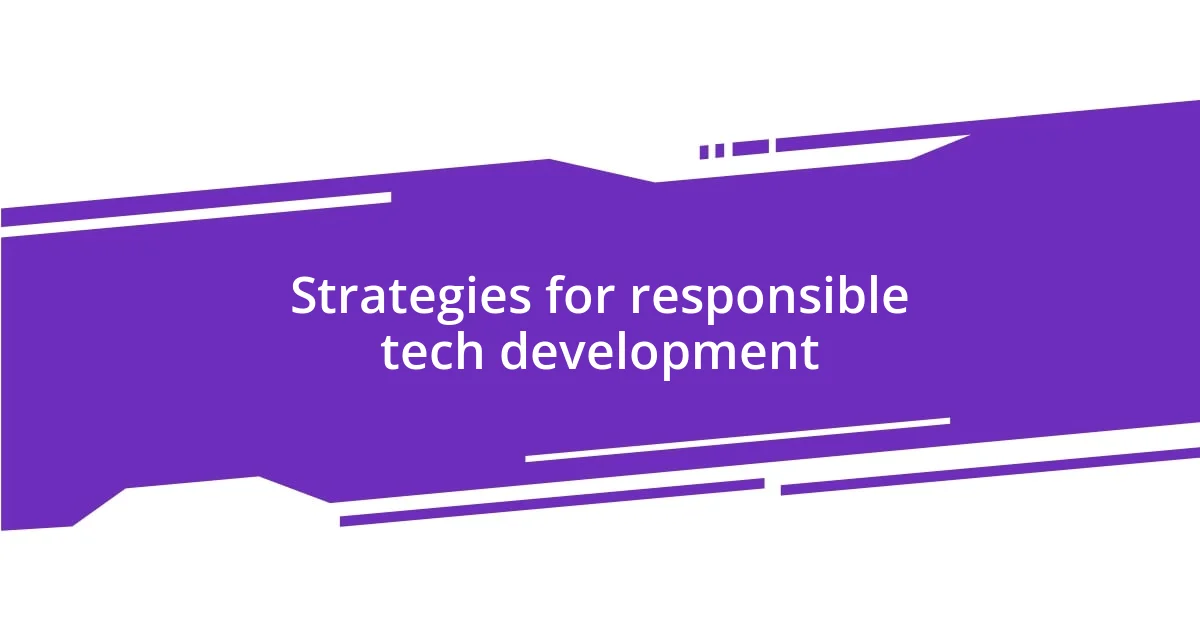
Strategies for responsible tech development
One strategy for responsible tech development is promoting cross-disciplinary collaboration. I vividly recall a workshop where technologists partnered with ethicists and sociologists. Watching them share their insights reminded me how diverse perspectives can uncover blind spots in tech design. Isn’t it fascinating how a software engineer might overlook user impact, while a psychologist sees the bigger picture? By incorporating varied expertise, we can create technologies that are not just efficient but also socially aware.
Another effective approach is implementing continuous feedback loops with users. I’ve seen companies flourish after actively engaging with their user base, ensuring they understand real-world implications of their products. When I used to participate in user-testing sessions, I found that the most valuable insights often came from everyday users sharing their experiences. How can we build tech responsibly if we’re not listening to the people who use it? Emphasizing open dialogue can steer development in a direction that truly meets users’ needs.
Lastly, adopting a transparent decision-making process can foster trust. In one instance, I was part of a tech initiative that shared development stages with the community. The openness led to meaningful discussions about potential pitfalls, ultimately guiding us away from potentially harmful choices. I often wonder, how can transparency empower users in understanding the tech around them? Creating a culture where decisions are made openly not only strengthens user trust but also enhances accountability in tech development.












